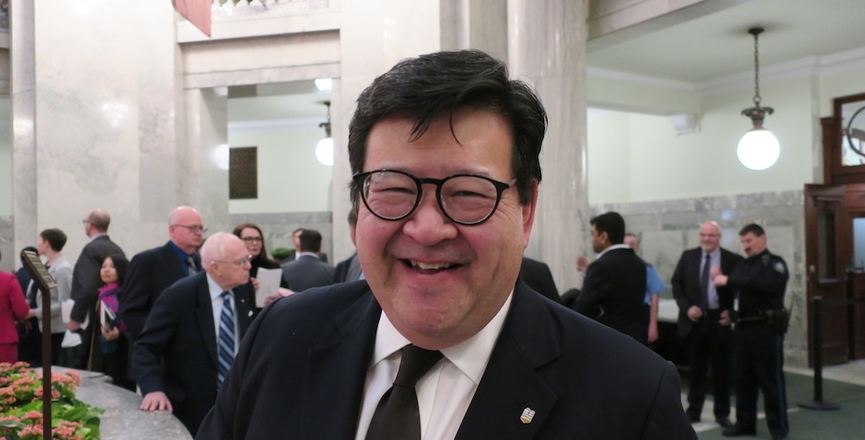It may not quite be impossible for Jason Kenney to see his dream of completing the Keystone XL pipeline to the U.S. Gulf Coast on his watch come true, but it will be almighty difficult with Democrat Joe Biden in the White House.
What’s more, if the project is to be completed the way Alberta’s premier wants, its success will depend heavily on the last guy the Kenney wants to be beholden to: Prime Minister Justin Trudeau.
Don’t take my word for that assessment. It’s what Gary Mar told me in a short conversation a few days ago, just before Alberta’s terrible pandemic performance started dominating the province’s political discourse.
Mar, the veteran Alberta politician from Calgary who came that close to being premier in 2011 after serving four years as Alberta’s envoy in Washington D.C., is probably in a better position than most of us to judge whatever potential is left in the project in which Kenney has sunk so much political and literal capital.
The United Conservative Party government has already invested $1.5 billion in what increasingly looks like a long shot, and it may be on the hook for another $6 billion for, basically, nothing. So if Biden pulls the plug on KXL, as is widely expected, and the project goes south metaphorically instead of literally, Alberta’s premier is going to have to wear it.
Having bet $7.5 billion of our money on Donald Trump winning the U.S. presidential election on November 3, there will be no one else for Kenney to blame, least of all his favourite target, Justin Trudeau.
I talked about this with Mar, who was recently named president and CEO of the Canada West Foundation in Calgary, because a Calgary Herald story two days after the election when the results were still in question made it sound as if he thought KXL wouldn’t necessarily be a goner even if Biden was declared the winner.
Well, sort of.
I asked, how could the project survive a new president who has pretty unequivocally said he will kill it, and who owes the U.S. environmental movement for its support?
“You’re right that the president-elect has been pretty consistent that he is not a supporter of the Keystone XL pipeline being built,” Mar responded.
What’s more, he noted, “this is one act that he can perform without reference to anybody else and just turn down the pipeline permit. It would be very easy for him to do.”
“If it’s simply a yes or no issue, he might just say no.”
Indeed, other Conservatives concede he probably will say no. John Baird, former minister of foreign affairs in Stephen Harper’s Conservative government, told the Canadian Press on November 9 that he reckoned “we’re in trouble on Keystone.”
“This is something (Biden) can do with the stroke of a pen and I’m deeply concerned that he will revoke the presidential permit,” Baird said.
But according to Mar, Premier Kenney may have one high card left to play — one with Trudeau’s face on it.
“We should not underestimate the fact the prime minister of Canada and the president-elect seem to have a very good relationship,” he said. “When two leaders really like each other, I think a lot of stuff can be done.”
Consider Ronald Reagan and Brian Mulroney, he added. Well, most of us would rather not, but the point is taken.
So don’t underestimate the potential of a good relationship, Mar said.
There will also likely be some trade union pressure on the new president to keep the project going, and some Democrats in Congress who would like to see it completed, he added, noting that before Trump was president, Canada was more likely to be treated favourably in the United States.
So, “if Keystone XL is only one of many issues, you might be able to thread the needle to get approval.”
However, he conceded, “it’s quite a needle to thread. I wouldn’t say I’m optimistic about it, but I think there’s way to thread the needle.”
So, I asked, should Kenney, a politician who’s been known to call U.S. Democrats who don’t share his views on pipelines “brain dead,” just shut up and let the PM do the heavy lifting?
Mar’s too much of an old pro to fall for a line like that. “We’ve got the province of Saskatchewan as interested in Keystone XL as the province of Alberta,” he responded. “All of the Canadian side’s got to be together in providing the same message … It’s got to be a co-ordinated effort. Both provincial governments and the federal government together.”
Well, Kenney did say at the UCP annual general meeting that his party should learn to walk and chew gum at the same time.
But as Mar repeated, “it’s not going to be a slam dunk. I think you’re threading a needle.”
Back in 2013, when Harper told a room full of Republican toffs in New York City that if president Barack Obama said no to KXL, “that won’t be final. This won’t be final until it’s approved and we will keep pushing forward.”
Obama did say no, on November 6, 2015, declaring that the pipeline was not in the national interest of the United States whether or not Stephen Harper was unwilling to take no for an answer.
Harper was proved right — at least temporarily — thanks to the election of Trump one year and two days later.
This time, though, if Biden says no, KXL will be done for.
Alberta will be out billions, and the only thing Kenney will have to show for it will be egg on his face.
David Climenhaga, author of the Alberta Diary blog, is a journalist, author, journalism teacher, poet and trade union communicator who has worked in senior writing and editing positions at The Globe and Mail and the Calgary Herald.
Image: David Climenhaga



